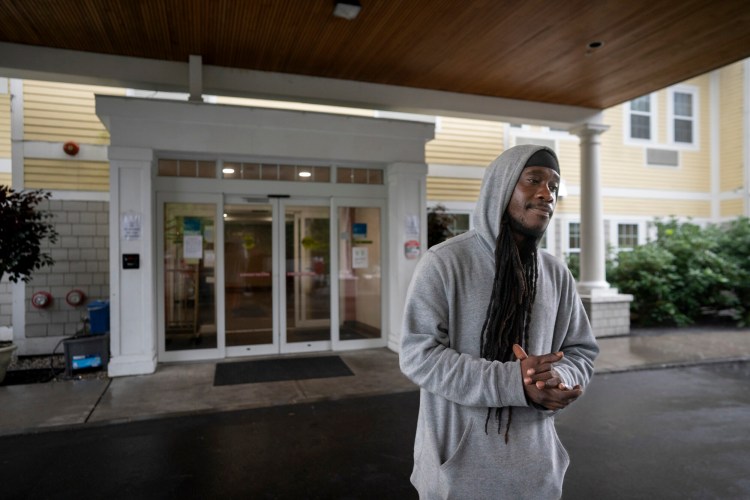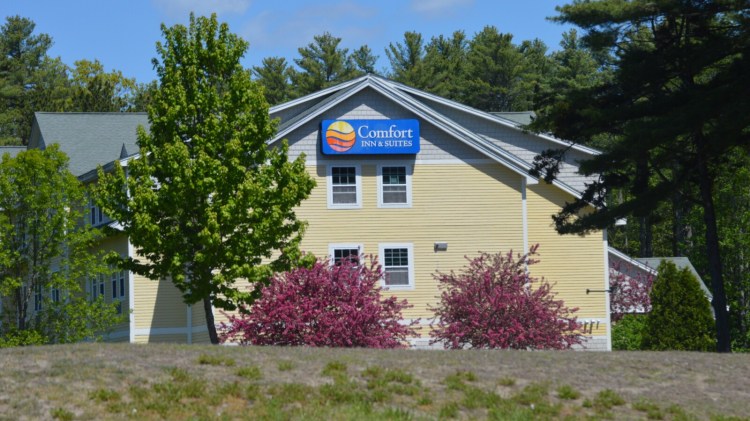


Tyshiem Brown stands outside the Comfort Inn in Scarborough on September 22, 2022. Brown, who was homeless and living at the hotel when it became a temporary shelter during the pandemic, has filed a lawsuit claiming he was wrongfully evicted. Gregory Rec/Staff Photographer
SCARBOROUGH – Two people housed at Comfort Inn & Suites during the pandemic claim they experienced housing discrimination when they were evicted after city officials applied for the hotel to resume short stays.
Tyshiem Brown and Corey Mitchell have filed separate lawsuits charging the city and the owners of the Route 1 hotel with discrimination based on race, color or receipt of public assistance, in violation of the U.S. Fair Housing Act and Maine Human Rights Act.
Both men are Black and lived at the hotel when it rented rooms to about 80 people who received federal emergency rental assistance during the pandemic and would otherwise have been homeless, the lawsuits say.
Their complaints were initially filed in December 2022 with the Maine Human Rights Commission, which dismissed the charges in April after the investigator found “no reasonable grounds” to believe the city discriminated against both men.
The lawsuits were filed in Cumberland County Superior Court in September and then moved to U.S. District Court in Portland in October at the request of the city’s attorney.
“They’re making federal charges and that’s where federal charges should be heard,” said Jonathan Brogan, an attorney at Norman Hanson Detroy in Portland.
“These are completely false allegations from people who received beds, housing and food from the city that they otherwise would not have received,” Brogan said. “Scarborough has done everything possible to ensure that people at the hotel were treated well at this difficult time. They even went so far as to bring packed lunches when they did not have access to food.”
Attorneys from Pine Tree Legal Assistance and Maine Equal Justice representing Brown and Mitchell did not respond to requests for interviews or written statements about the complaints.
Both men were and still are unemployed; they also moved out of their home before living at the hotel and are now out of their home, according to the lawsuits.
COMPLAINTS OF DISCRIMINATION
The complaints allege that city officials and the hotel owners treated Brown and Mitchell differently based on their race, color and receipt of government assistance; and that they perpetuated the segregation of every man in the community when they failed to provide fair housing.
Furthermore, when the men were evicted from the hotel, they had to leave Scarborough because they could not afford rents that averaged $1,900 per month; and because the city’s zoning code and other regulations prohibit camping or the construction of a shelter for residents experiencing homelessness, the lawsuits say.
“There was no homeless shelter or any other temporary shelter for Brown or Mitchell to move to in Scarborough,” the lawsuits state.
However, Jane O’Reilly, the state’s human rights investigator, found that while city zoning limits temporary housing, and homeless shelters are not an expressly permitted use, city zoning does not prohibit the construction of a homeless shelter.
O’Reilly noted that neither Brown, Mitchell, nor anyone acting on their behalf had attempted to build a homeless shelter in Scarborough and had been denied permission by the city’s zoning board. And neither man showed they wanted to live in the city after being kicked out of the hotel, O’Reilly said in reports to the committee.
HOTEL BECOMES LODGED
The Comfort Inn rented rooms only to people receiving money from the federal Emergency Rental Assistance Program from September 2021 to April 2023, the lawsuits said.


The Comfort Inn & Suites in Scarborough in May 2022. Drew Johnson/The Predictor
The program provided more than $46 billion to eligible renters across the country during the COVID-19 pandemic residents of other hotels in Maine.
Mitchell rented a room at the Comfort Inn from March 2021 to April 2023 under the temporary rental assistance program, which was administered at the hotel by The Opportunity Alliance, a nonprofit community action agency with offices in Portland and South Portland.
Brown lived there from September 2021 to mid-February 2023, his lawsuit states.
The temporary rental assistance program ran out of funding in September 2022, and by the end of the year the agency’s social workers had had no more employees the program in the hotel.
THE CITY BREAKS
In September 2022, the city council agreed to renew the hotel’s operating permit, subject to the owners’ plan to leave temporary housing and resume normal hotel operations by January 1, 2023 – a step that will put the hotel back in would comply with the city’s requirements. zoning plan and permit rules.
The plan called for a staggered eviction process “to facilitate the safe and orderly removal of all current guests” from the 69-room hotel. Eviction notices would be served several weeks before guests were expected to leave. Brown was deported in February 2023 and Mitchell in April 2023, the lawsuits state.
The annual license renewal had been postponed since May 2022, while local owner, Nexgen Hospitality Inc., addressed city officials’ concerns about a large number of public safety calls generated by hotel tenants.
The Comfort Inn was one of several hotels in Scarborough that were monitored for emergency calls during the permit renewal process, but it was the only hotel whose permit was not renewed in May, the lawsuits said.
Nexgen and the hotel’s parent company, Choice Hotels International of Bethesda, Maryland, did not respond to requests for interviews or written statements.
COMPENSATION FOR DAMAGES
Brown and Mitchell were among 78 people in 48 households living at the hotel on emergency rental assistance, the lawsuits said. They were also among the 14 people (18%) staying at the hotel who identified as black or African American, along with 45 white people (59%); seven from other races (9%); and 12 whose race was not reported (15%).
At the time, 35% of people experiencing homelessness in Maine identified as black or African American, the lawsuit said.
Brown was interviewed in September 2022 for a Portland Press Herald story about him awaiting deportation.
“I’m a little concerned, but I’ve got some things figured out,” said Brown, who was 39 at the time. He was unable to work and had been living at the hotel since December 2021, he said. Social workers helped him find an apartment in Farmington, he said, but that would have been too far from his daughter, who lived with her mother in Portland.
“I don’t want to be too far away from her,” he said.
The lawsuits seek compensation and damages for the damages Brown and Mitchell say they suffered, as well as payment of legal fees.
They are also seeking declaratory judgments and permanent injunctions banning city officials and the hotel’s owners from discriminating against anyone in housing and requiring them to undergo training on fair housing practices.
And they are asking the court to enjoin the city from issuing or enforcing permits, zoning ordinances and other ordinances relating to housing in an arbitrary manner that adversely affects residents based on their economic or housing status.
Copy the story link